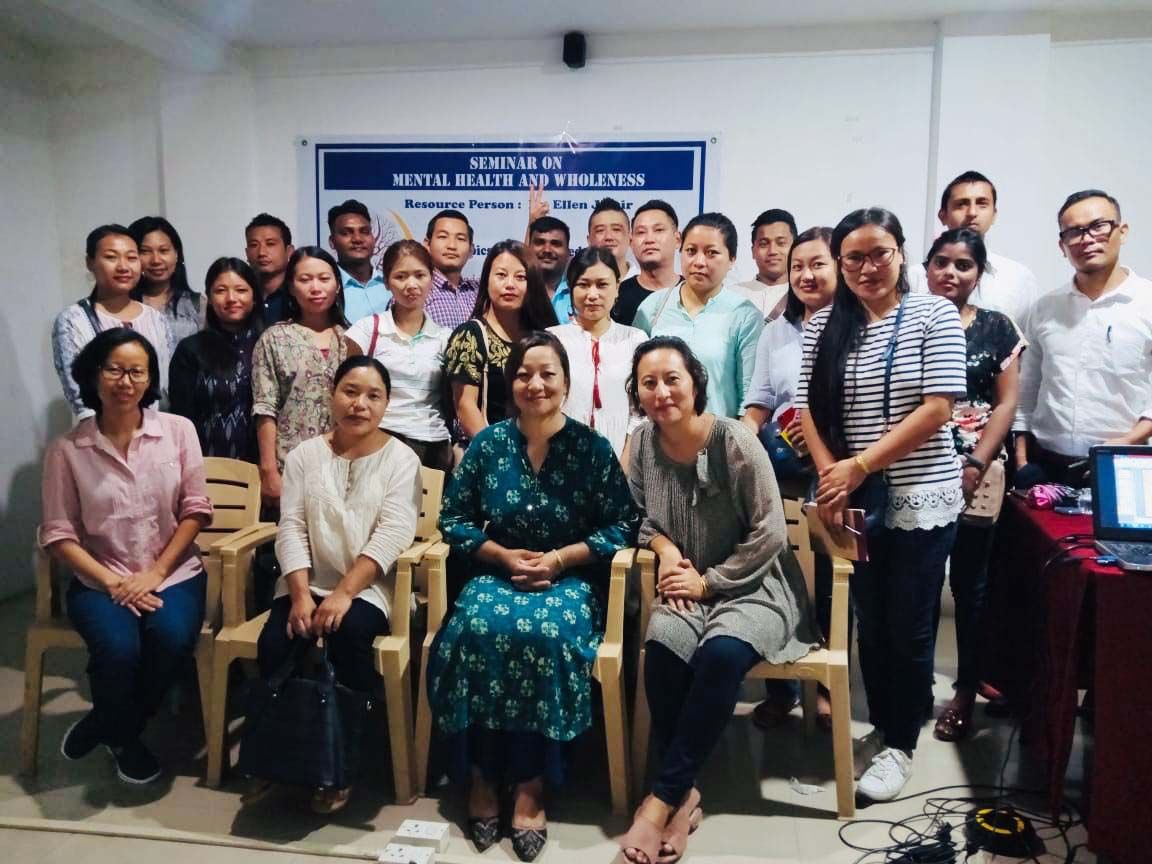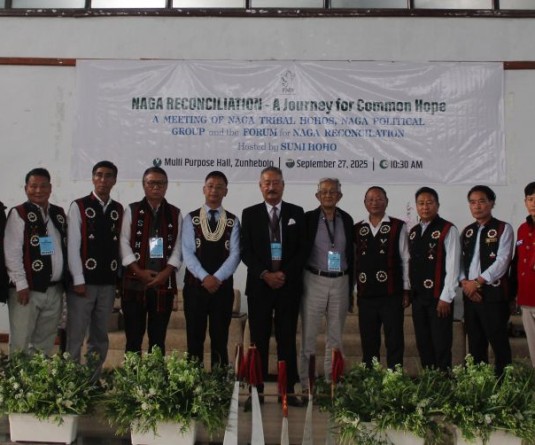‘Need a safe environment for people with mental health issues in Naga society’

Rev. Dr. Ellen K Jamir with participants during the seminar on ‘Mental health & wholeness’ organized by Humanity International at Hotel Silhouette on Saturday. (Morung Photo)
Morung Express News
Dimapur | August 17
In a community–oriented society such as the Nagas, the word “mental” still has strong connotations with words like shame, sin and stigma. And though mental health problems are not uncommon in Naga society, people prefer to deal such problems within the family circle rather than seek professional help due to the negative connotations.
But mental health is an important facet of life and health when it comes to one’s wholeness. This area of health is often neglected, stigmatized or misunderstood, said Rev. Dr. Ellen K Jamir, associate professor, Oriental Theological Seminary, and psychotherapist at NHHRC.
“We may or may not even be aware that apart from the physical health issues that people suffer from like diabetes, arthritis, cancer, thyroid conditions etc., people also suffer from mental illness. It is less understood or acknowledged and people get treated more for physical and physiological conditions”, Dr. Allen said.
Mental health defined
Ellen, the resource person at the seminar on ‘Mental health & wholeness’ organized by Humanity International here at Hotel Silhouette on Saturday, dwelled on understanding mental health and wholeness, profiles of mental illness (case studies) and response to mental illness.
She said the word ‘mental illness’ is used to describe as continuum of emotional issues from mild depression or mood disorder to serious brain disorders that affect one’s ability to function.
“Mental illness seldom has one single cause. As humans, our mind, body and spirit are interconnected in complex and amazing ways. When something goes wrong in one area, other areas are also affected. Biochemical change in the brain chemistry or certain medical conditions can cause such illness, she said.
The psychotherapist also said persons lacking social and spiritual support, and people who feel isolated or have low self-esteem are at a higher risk of developing a mood disorder. Besides, poverty, lack to access of medical care and social marginalization are added factors, she said.
“Traumatic events in life and the perceived absence or purpose or meaning of one’s life can contribute to the onset of a mood disorder…We need to do away with the presence of stigma and fear about mental health issues. It is not for everyone to diagnose and treat themselves. However it is important for everyone to be aware of the signs and symptoms leading to the mental health disorder. We need to explore health issues from a holistic perspective”, Ellen said.
The stigma of mental health in Naga society
In the Naga context, she said dialoguing with a mental health professional one-on-one or availing psychotherapy services is foreign to many. Also, there is a lot of shame attached to persons going through problems. Going to a counselor or a psychotherapist is often an unexplored option here in our context, the psychotherapist added.
She said the various types of mental health conditions include depression, bipolar disorder, anxiety disorders and posttraumatic stress disorder (PTSD), obsessive/compulsive disorder (OCD), substance abuse related conditions, schizophrenia etc.
Need for caring communities
And what should be the response of the individual and community to those with mental illness problems?
“Can we open up a safe environment to help people walk through or share their issues and struggles? Can we show love in action, actions that are redemptive and transformative?” Ellen asked.
She said one has to be aware and cautious of one’s own feelings and experiences while helping others, that our own problems do not become a barrier in the healing process of others, and to develop non-judgmental listening.
Dr. Ellen also stressed on the need to create “caring communities” through education, commitment (find intentional ways to become a caring community), openness (integrate the sick into community life), support (having a referral list of mental health services) and advocacy (seek justice and pursue it. Provide access to medical and legal help).
She further said ‘Faith’ plays a major role in providing help and support for mentally ill patients and families and spiritual themes like love suffering, forgiveness, redemption and hope, can prove to be very helpful.



.jpg)

